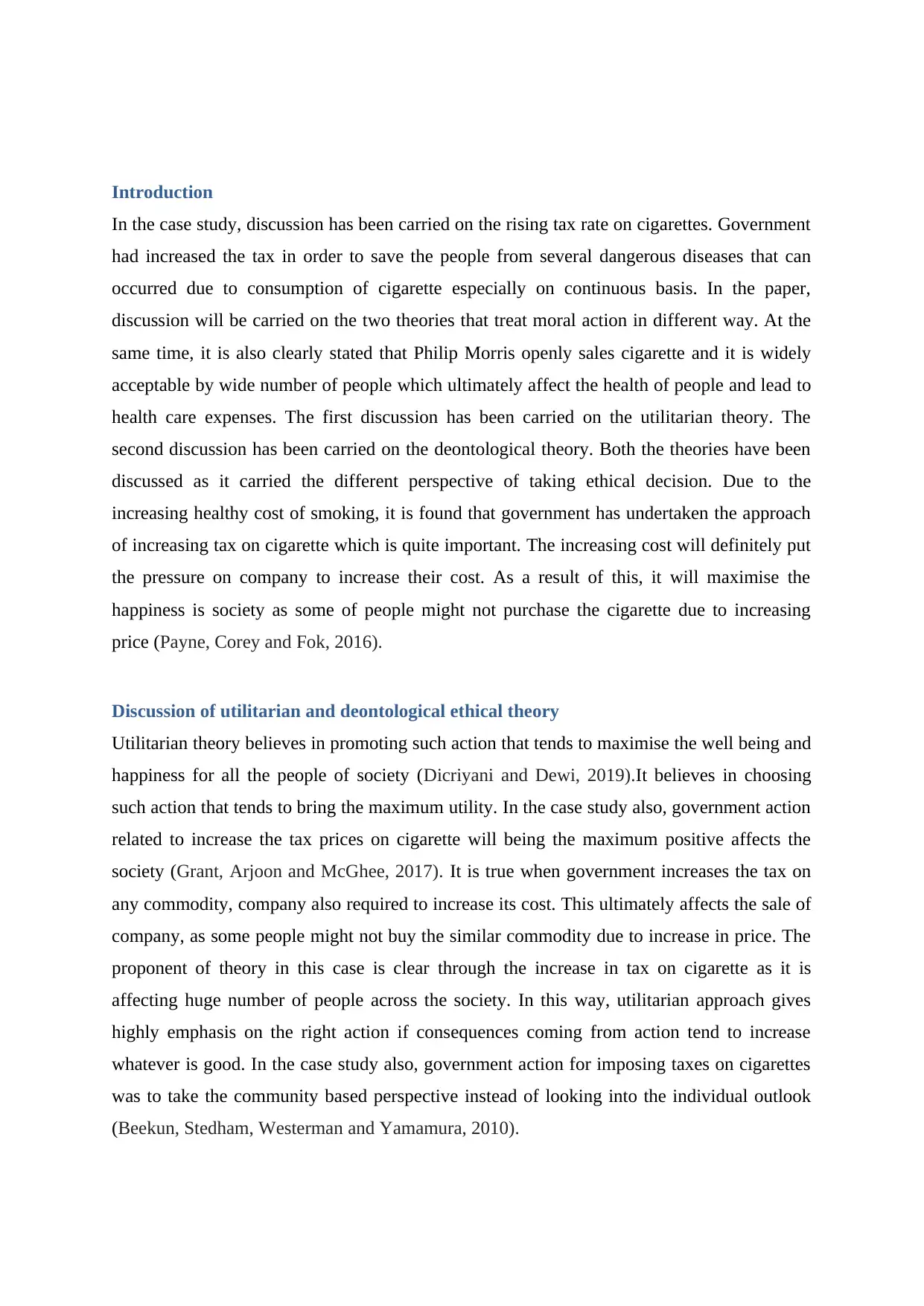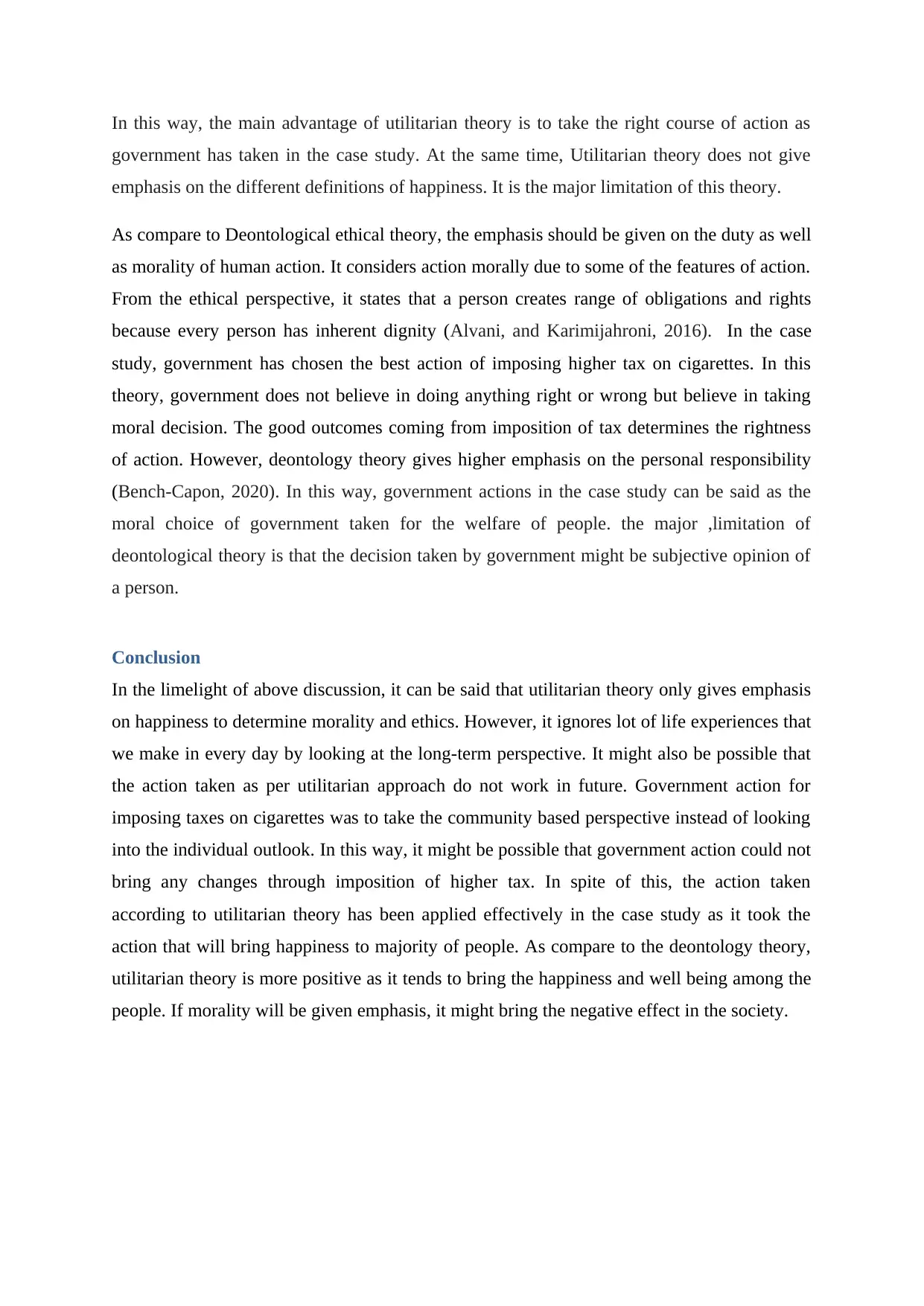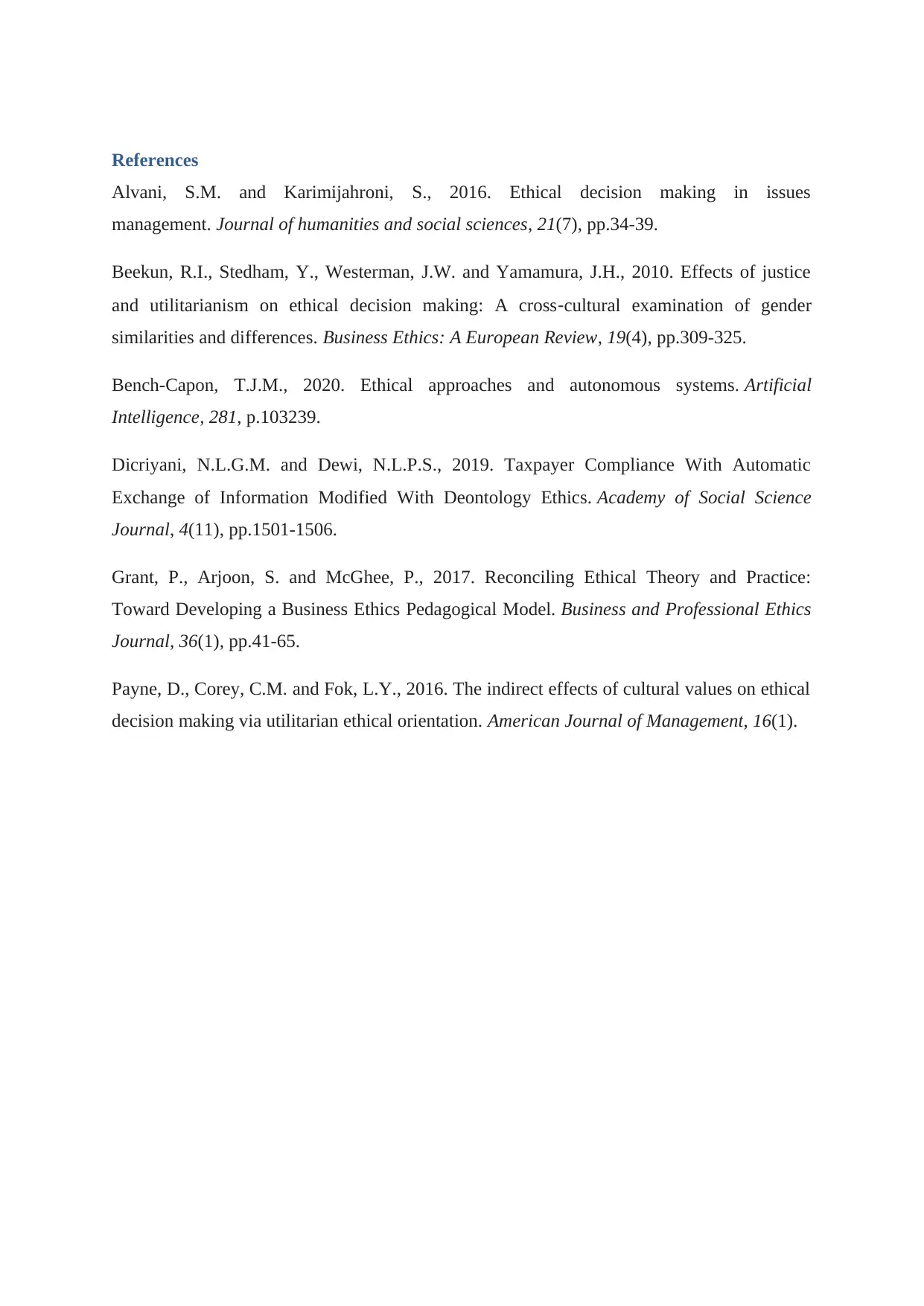Case Study: Ethical Considerations of Cigarette Tax and Public Health
VerifiedAdded on 2022/08/12
|4
|1095
|29
Case Study
AI Summary
This case study examines the ethical considerations of government policies regarding cigarette taxation. The assignment analyzes the implementation of increased taxes on cigarettes to mitigate health risks and reduce healthcare costs associated with smoking. It explores two primary ethical frameworks: utilitarianism and deontology. The utilitarian perspective emphasizes maximizing societal well-being by potentially reducing smoking rates through higher prices, thereby benefiting public health. Conversely, the deontological approach focuses on the inherent moral duties and rights involved, evaluating the government's actions based on principles of fairness and individual responsibility, even if the outcome isn't always optimal for overall happiness. The case study highlights the advantages and limitations of each ethical theory in the context of public health policy, ultimately demonstrating the complex interplay between economic decisions and ethical considerations.

qwertyuiopasdfghjklzxcvbnmqw
ertyuiopasdfghjklzxcvbnmqwert
yuiopasdfghjklzxcvbnmqwertyui
opasdfghjklzxcvbnmqwertyuiop
asdfghjklzxcvbnmqwertyuiopasd
fghjklzxcvbnmqwertyuiopasdfgh
jklzxcvbnmqwertyuiopasdfghjkl
zxcvbnmqwertyuiopasdfghjklzxc
vbnmqwertyuiopasdfghjklzxcvb
nmqwertyuiopasdfghjklzxcvbnm
qwertyuiopasdfghjklzxcvbnmqw
ertyuiopasdfghjklzxcvbnmqwert
yuiopasdfghjklzxcvbnmqwertyui
opasdfghjklzxcvbnmqwertyuiop
asdfghjklzxcvbnmqwertyuiopasd
fghjklzxcvbnmqwertyuiopasdfgh
jklzxcvbnmrtyuiopasdfghjklzxcv
Healthcare and society
ertyuiopasdfghjklzxcvbnmqwert
yuiopasdfghjklzxcvbnmqwertyui
opasdfghjklzxcvbnmqwertyuiop
asdfghjklzxcvbnmqwertyuiopasd
fghjklzxcvbnmqwertyuiopasdfgh
jklzxcvbnmqwertyuiopasdfghjkl
zxcvbnmqwertyuiopasdfghjklzxc
vbnmqwertyuiopasdfghjklzxcvb
nmqwertyuiopasdfghjklzxcvbnm
qwertyuiopasdfghjklzxcvbnmqw
ertyuiopasdfghjklzxcvbnmqwert
yuiopasdfghjklzxcvbnmqwertyui
opasdfghjklzxcvbnmqwertyuiop
asdfghjklzxcvbnmqwertyuiopasd
fghjklzxcvbnmqwertyuiopasdfgh
jklzxcvbnmrtyuiopasdfghjklzxcv
Healthcare and society
Paraphrase This Document
Need a fresh take? Get an instant paraphrase of this document with our AI Paraphraser

Introduction
In the case study, discussion has been carried on the rising tax rate on cigarettes. Government
had increased the tax in order to save the people from several dangerous diseases that can
occurred due to consumption of cigarette especially on continuous basis. In the paper,
discussion will be carried on the two theories that treat moral action in different way. At the
same time, it is also clearly stated that Philip Morris openly sales cigarette and it is widely
acceptable by wide number of people which ultimately affect the health of people and lead to
health care expenses. The first discussion has been carried on the utilitarian theory. The
second discussion has been carried on the deontological theory. Both the theories have been
discussed as it carried the different perspective of taking ethical decision. Due to the
increasing healthy cost of smoking, it is found that government has undertaken the approach
of increasing tax on cigarette which is quite important. The increasing cost will definitely put
the pressure on company to increase their cost. As a result of this, it will maximise the
happiness is society as some of people might not purchase the cigarette due to increasing
price (Payne, Corey and Fok, 2016).
Discussion of utilitarian and deontological ethical theory
Utilitarian theory believes in promoting such action that tends to maximise the well being and
happiness for all the people of society (Dicriyani and Dewi, 2019).It believes in choosing
such action that tends to bring the maximum utility. In the case study also, government action
related to increase the tax prices on cigarette will being the maximum positive affects the
society (Grant, Arjoon and McGhee, 2017). It is true when government increases the tax on
any commodity, company also required to increase its cost. This ultimately affects the sale of
company, as some people might not buy the similar commodity due to increase in price. The
proponent of theory in this case is clear through the increase in tax on cigarette as it is
affecting huge number of people across the society. In this way, utilitarian approach gives
highly emphasis on the right action if consequences coming from action tend to increase
whatever is good. In the case study also, government action for imposing taxes on cigarettes
was to take the community based perspective instead of looking into the individual outlook
(Beekun, Stedham, Westerman and Yamamura, 2010).
In the case study, discussion has been carried on the rising tax rate on cigarettes. Government
had increased the tax in order to save the people from several dangerous diseases that can
occurred due to consumption of cigarette especially on continuous basis. In the paper,
discussion will be carried on the two theories that treat moral action in different way. At the
same time, it is also clearly stated that Philip Morris openly sales cigarette and it is widely
acceptable by wide number of people which ultimately affect the health of people and lead to
health care expenses. The first discussion has been carried on the utilitarian theory. The
second discussion has been carried on the deontological theory. Both the theories have been
discussed as it carried the different perspective of taking ethical decision. Due to the
increasing healthy cost of smoking, it is found that government has undertaken the approach
of increasing tax on cigarette which is quite important. The increasing cost will definitely put
the pressure on company to increase their cost. As a result of this, it will maximise the
happiness is society as some of people might not purchase the cigarette due to increasing
price (Payne, Corey and Fok, 2016).
Discussion of utilitarian and deontological ethical theory
Utilitarian theory believes in promoting such action that tends to maximise the well being and
happiness for all the people of society (Dicriyani and Dewi, 2019).It believes in choosing
such action that tends to bring the maximum utility. In the case study also, government action
related to increase the tax prices on cigarette will being the maximum positive affects the
society (Grant, Arjoon and McGhee, 2017). It is true when government increases the tax on
any commodity, company also required to increase its cost. This ultimately affects the sale of
company, as some people might not buy the similar commodity due to increase in price. The
proponent of theory in this case is clear through the increase in tax on cigarette as it is
affecting huge number of people across the society. In this way, utilitarian approach gives
highly emphasis on the right action if consequences coming from action tend to increase
whatever is good. In the case study also, government action for imposing taxes on cigarettes
was to take the community based perspective instead of looking into the individual outlook
(Beekun, Stedham, Westerman and Yamamura, 2010).

In this way, the main advantage of utilitarian theory is to take the right course of action as
government has taken in the case study. At the same time, Utilitarian theory does not give
emphasis on the different definitions of happiness. It is the major limitation of this theory.
As compare to Deontological ethical theory, the emphasis should be given on the duty as well
as morality of human action. It considers action morally due to some of the features of action.
From the ethical perspective, it states that a person creates range of obligations and rights
because every person has inherent dignity (Alvani, and Karimijahroni, 2016). In the case
study, government has chosen the best action of imposing higher tax on cigarettes. In this
theory, government does not believe in doing anything right or wrong but believe in taking
moral decision. The good outcomes coming from imposition of tax determines the rightness
of action. However, deontology theory gives higher emphasis on the personal responsibility
(Bench-Capon, 2020). In this way, government actions in the case study can be said as the
moral choice of government taken for the welfare of people. the major ,limitation of
deontological theory is that the decision taken by government might be subjective opinion of
a person.
Conclusion
In the limelight of above discussion, it can be said that utilitarian theory only gives emphasis
on happiness to determine morality and ethics. However, it ignores lot of life experiences that
we make in every day by looking at the long-term perspective. It might also be possible that
the action taken as per utilitarian approach do not work in future. Government action for
imposing taxes on cigarettes was to take the community based perspective instead of looking
into the individual outlook. In this way, it might be possible that government action could not
bring any changes through imposition of higher tax. In spite of this, the action taken
according to utilitarian theory has been applied effectively in the case study as it took the
action that will bring happiness to majority of people. As compare to the deontology theory,
utilitarian theory is more positive as it tends to bring the happiness and well being among the
people. If morality will be given emphasis, it might bring the negative effect in the society.
government has taken in the case study. At the same time, Utilitarian theory does not give
emphasis on the different definitions of happiness. It is the major limitation of this theory.
As compare to Deontological ethical theory, the emphasis should be given on the duty as well
as morality of human action. It considers action morally due to some of the features of action.
From the ethical perspective, it states that a person creates range of obligations and rights
because every person has inherent dignity (Alvani, and Karimijahroni, 2016). In the case
study, government has chosen the best action of imposing higher tax on cigarettes. In this
theory, government does not believe in doing anything right or wrong but believe in taking
moral decision. The good outcomes coming from imposition of tax determines the rightness
of action. However, deontology theory gives higher emphasis on the personal responsibility
(Bench-Capon, 2020). In this way, government actions in the case study can be said as the
moral choice of government taken for the welfare of people. the major ,limitation of
deontological theory is that the decision taken by government might be subjective opinion of
a person.
Conclusion
In the limelight of above discussion, it can be said that utilitarian theory only gives emphasis
on happiness to determine morality and ethics. However, it ignores lot of life experiences that
we make in every day by looking at the long-term perspective. It might also be possible that
the action taken as per utilitarian approach do not work in future. Government action for
imposing taxes on cigarettes was to take the community based perspective instead of looking
into the individual outlook. In this way, it might be possible that government action could not
bring any changes through imposition of higher tax. In spite of this, the action taken
according to utilitarian theory has been applied effectively in the case study as it took the
action that will bring happiness to majority of people. As compare to the deontology theory,
utilitarian theory is more positive as it tends to bring the happiness and well being among the
people. If morality will be given emphasis, it might bring the negative effect in the society.
⊘ This is a preview!⊘
Do you want full access?
Subscribe today to unlock all pages.

Trusted by 1+ million students worldwide

References
Alvani, S.M. and Karimijahroni, S., 2016. Ethical decision making in issues
management. Journal of humanities and social sciences, 21(7), pp.34-39.
Beekun, R.I., Stedham, Y., Westerman, J.W. and Yamamura, J.H., 2010. Effects of justice
and utilitarianism on ethical decision making: A cross‐cultural examination of gender
similarities and differences. Business Ethics: A European Review, 19(4), pp.309-325.
Bench-Capon, T.J.M., 2020. Ethical approaches and autonomous systems. Artificial
Intelligence, 281, p.103239.
Dicriyani, N.L.G.M. and Dewi, N.L.P.S., 2019. Taxpayer Compliance With Automatic
Exchange of Information Modified With Deontology Ethics. Academy of Social Science
Journal, 4(11), pp.1501-1506.
Grant, P., Arjoon, S. and McGhee, P., 2017. Reconciling Ethical Theory and Practice:
Toward Developing a Business Ethics Pedagogical Model. Business and Professional Ethics
Journal, 36(1), pp.41-65.
Payne, D., Corey, C.M. and Fok, L.Y., 2016. The indirect effects of cultural values on ethical
decision making via utilitarian ethical orientation. American Journal of Management, 16(1).
Alvani, S.M. and Karimijahroni, S., 2016. Ethical decision making in issues
management. Journal of humanities and social sciences, 21(7), pp.34-39.
Beekun, R.I., Stedham, Y., Westerman, J.W. and Yamamura, J.H., 2010. Effects of justice
and utilitarianism on ethical decision making: A cross‐cultural examination of gender
similarities and differences. Business Ethics: A European Review, 19(4), pp.309-325.
Bench-Capon, T.J.M., 2020. Ethical approaches and autonomous systems. Artificial
Intelligence, 281, p.103239.
Dicriyani, N.L.G.M. and Dewi, N.L.P.S., 2019. Taxpayer Compliance With Automatic
Exchange of Information Modified With Deontology Ethics. Academy of Social Science
Journal, 4(11), pp.1501-1506.
Grant, P., Arjoon, S. and McGhee, P., 2017. Reconciling Ethical Theory and Practice:
Toward Developing a Business Ethics Pedagogical Model. Business and Professional Ethics
Journal, 36(1), pp.41-65.
Payne, D., Corey, C.M. and Fok, L.Y., 2016. The indirect effects of cultural values on ethical
decision making via utilitarian ethical orientation. American Journal of Management, 16(1).
1 out of 4
Related Documents
Your All-in-One AI-Powered Toolkit for Academic Success.
+13062052269
info@desklib.com
Available 24*7 on WhatsApp / Email
![[object Object]](/_next/static/media/star-bottom.7253800d.svg)
Unlock your academic potential
Copyright © 2020–2026 A2Z Services. All Rights Reserved. Developed and managed by ZUCOL.





